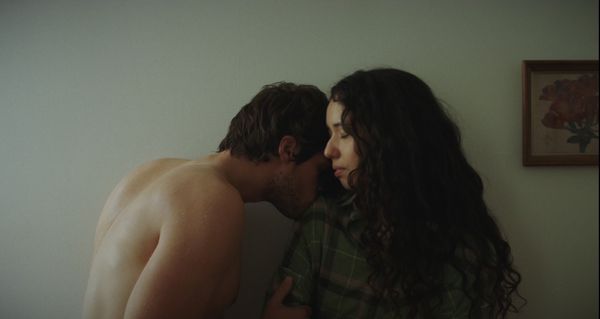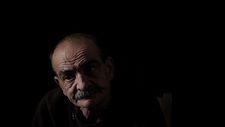 |
| This Closeness |
Director Kit Zauhar uses her sophomore feature, This Closeness, as a Petri dish to explore human nature in a claustrophobic Philadelphia apartment. The plot centres on couple, Tessa (Zauhar) and Ben (Zane Pais), who are in town for his high school reunion. Renting a room in a stranger’s apartment, Tessa begins to form a bond with Adam (Ian Edlund), their temporary lonely and introverted roommate, as tensions mount with her boyfriend.
In conversation with Eye For Film at this year’s SXSW, where the film screened in the Narrative Spotlight section, Zauhar discussed her interest in critiquing white masculinity, and using 'trivialities' to scratch the surface of the human experience.
Paul Risker: Why acting, writing and directing as a means of creative expression? Was there an inspirational or defining moment?
Kit Zauhar: I don't know if I had one moment where I knew. I'm a lucky individual, who understood what I wanted to do from a young age - that's lucky because not a lot of people get that experience. Some people spend their whole lives trying to figure out what they would like to do, as much as I love filmmaking. It has been an accumulation of moments throughout my life, that solidified this yen I've always felt for filmmaking and acting.
PR: Filmmakers, like any artist, are on a journey to discover their own creative voice. I recall a French filmmaker telling me that you make your first film with the impression of what you think cinema is, then you discover what it is.
KZ: I never really knew what cinema was supposed to be, which freed me from a lot of the constraints. I don't come from a filmmaking family, and before I went to NYU, I didn't have any filmmaking experience.
Honestly, when I hear something like your first films are what you think films are, that feels very masculine to me. When people say that, they're thinking about movies by old white men. I'm not an old white man, and so I was never going to make a film like them.
What finding my cinematic language meant for me was watching a lot of movies, but also figuring out how I experience, I see the world and other people, and also how I'm listening to the world.
PR: I think it was a novelist that said writers have to be like sponges. A miscomprehension with writers is that they are liberal in appropriating what they see and hear, instead of it being more of an awareness of life's emotional range.
 |
| Kit Zauhar |
KZ: I gravitate towards certain interactions and [types of] people, and that informs my writing. I'm interested in how people communicate and especially how they communicate about little things. The big philosophical discussions are sometimes not as compelling to me. What interests me is how themes come out in the very small moments and interactions, the trivial things [in life].
The idea is nothing is trivial about the human experience because it all reflects deeper ideas and themes about humanity. It’s more fun to focus on the 'trivialities' because that's where the messiness of the human drama is.
PR: Talk me through the thought process of how you put a film together. Some filmmakers describe it to me as a journey of discovery, and Pablo Larraín even told me he finds the film in the final cut.
KZ: In terms of the dialogue, from scene to scene, I'm not word perfect, but I want to stay true to the text. There's not a tonne of improv, simply because we don't have the time on a low budget set to figure out how things work. From page to screen, it's similar – we had to edit a lot of scenes out.
It was two hours, 20 minutes at the beginning and now it's an hour and a half. I like to say I feel I was some crazy knight that goes into a small village and pillages everything, slashing everything out. So that's the biggest difference.
I get really scared when people say they find the story in the edit because I'm a writer, so I need the story to be in the prose on the page. The story is always there to begin with, and how it builds [itself] out into a film is more about the process of making it, and doing a concise job with the direction.
PR: How do you perceive the relationship between this film and your directorial feature debut?
KZ: The biggest difference is, my first film was 'auto-fiction' - a hot, bright new word in literature. This film is not that, and it feels more like what will become the pattern in my filmography if I've the luck to continue. What’s in both is the idea of the trivialities revealing more about humanity and relationships than they might seem to at first - about being a young person, being a young woman of colour, and this feels like it's going to continue.
PR: This Closeness is a claustrophobic story, and while there’s a lack of a dramatic arc, instead a microscopic or condensed examination of human nature, it duly contradicts itself.
KZ: Another word I've heard is a human Petri dish. I think this film is very much a human Petri dish, that’s about contemporary culture and masculinity. This film was originally going to be a play. I'd written it for the stage, and so there's a theatrical element to it.
The same way an audience gets to understand the concentrated scope of a stage, you're able to understand this environment fully because of its limitations.
PR: Your character has the capacity to be judgemental, but has more empathy than Ben. They share an interesting dynamic, and it’s difficult to watch the film without casting judgement.
KZ: I like to say that this film is about how masculinity poisons both men and women. The worst parts of my character are what feel masculine. Masculinity exists in everyone to varying degrees, regardless of gender. I do feel that's the part that can poison your soul and your other interactions. Maybe poison is too strong of a word, but it can really taint it I guess, and so I welcome people not liking anyone in the film - that's fine.
The characters I like watching are because of their unlikeable moral side. I feel comfortable with you judging them because they don't do good things, so they should be judged. Just because their experience is being documented on the screen, doesn't mean they have an inherent moral superiority.
PR: From a female filmmaker’s point-of-view, how toxic is masculinity in cinema today, and specifically in regards to white masculinity?
KZ: It's not just in cinema, it's the whole world [laughs].
[…] It's easy for someone like me to talk about white masculinity and get upset. I'm not necessarily upset - on a cosmic and philosophical level, I’m upset about all of these issues. But day-to-day, I love writing about white people, white men specifically, and documenting them. They have a lot going on that needs to be explored narratively.
The people with the most power, of course it's unfair and there is inequity, but it's certainly fascinating to see white men be white men, and figure out ways to interrogate that experience. I'm going to probably do more for the world making films about characters like my shitty white boyfriend, than I am completely ignoring them in my cinematic universe.





















